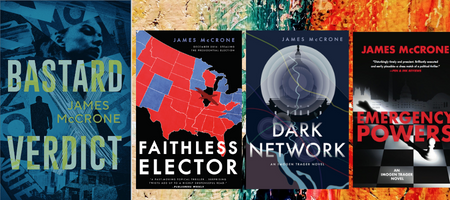I’m pretty sure that’s not what Adam McKay would say about institutions (the law, courts, norms, democratic rule) but I would nevertheless love for him to read and respond to my Faithless Elector thriller series. Because as gratifying as it’s been for the books to find readers who see the political moment reflected in the pages of my books, the larger narrative sometimes gets lost; that the present moment has been a long time coming. And the moment isn’t over.
Speaking to David Marchese in the NY Times magazine, McKay talks about what “hooked” him in Michael Lewis’s The Big Short (which he produced for the screen). Reading the book in one night, he says that “[Lewis] does two things. Number 1, we all love the taste of making a lot of money. The other thing we all love is knowing things that we’re not supposed to know. Lewis tells me things that most people don’t tell me…” He goes on to say that what he asks of a work is: “Is there a sincere attempt to understand the world, or is the action just one of manipulation and distraction?”
In the three books that make up the series—Faithless Elector, Dark Network and Emergency Powers—I’ve tried to do just that–to tell a story that tries to understand the world, one that doesn’t talk down to the reader, nor one that has an axe to grind. They’re about insider politics, and delve into things you thought you knew about in a new way: strong, character-driven stories set within a context of conflicted, dangerous politics. The conspirators exploit weaknesses in our legal/constitutional institutions to effect their power grab—motivated, as McKay discusses “by pure power and reactionary beliefs.” And if they can get hold of all the levers of power, they may very well succeed.
The “Faithless Elector” conspiracy, and the forces arrayed against America in my stories didn’t rise with Trump (he’s nowhere in their pages). Rather, it’s part of a much longer trajectory and deeper worry. And those forces haven’t gone away now that Trump’s making his noise offstage.
I would urge anyone thinking or writing about politics to give the interview a good read. It’s the kind of insightful, reasoned (yet still passionate and opinionated) discussion many of us lament as lacking these days. He also zeroes in on the dearth—in literature and in politics—of working people’s voices. Which, again, my work strives to bring into the conversation. Meetings between the FBI and “regular” folk aren’t caricatures, but are meant to be rounded people, to add nuance and complexity to the plot—and the stakes—as the story unfolds.
Later in the interview, McKay makes an interesting claim about center-left and center-right politics, putting himself in the CL corner, and Aaron Sorkin’s work on the CR. It’s Sorkin’s faith in institutions (again, the law, courts, norms) that pushes him rightward in McKay’s view. (McKay is careful not to claim that Sorkin is a right-winger). McKay’s observations and phrasing are in keeping with a balanced, long-view perspective. By McKay’s rendering, I guess I’d end up CR, too. Which is an uncomfortable feeling…
But insofar as my work enlightens, as it is a sincere attempt to understand the world, I’ll accept it.
Far from contributing to the politics of distraction and outrage porn, the Faithless Elector series reads, in the words of one reviewer, like an “insider’s view” of power politics. The conspirators manipulate the Electoral College, the congress and the bureaucracy from the inside–and for their own ends–with the future of the nation in the balance. It is characters in and out of government who risk their lives to right the ship of state. What my characters oppose is not bureaucracy, or legal authority, but the perversion of those institutions.
There’s a quote posted above my home computer, from Professor Emilios Christodoulidis at the University of Glasgow School of Law:
“Any separation between legal and political power is purely conceptual…there can be no real legal authority without some political power…[and] there is rarely political power without some legal authority.”
(from Jurisprudence: Themes and Concepts )
As the tagline for Dark Network notes: “Without law, there’s only power.” To which, perhaps I should add, And what about when law protects and abets the powerful?
# # #

James McCrone is the author of the Imogen Trager political suspense-thrillers Faithless Elector and Dark Network , about a stolen presidency, a conspiracy, and a nation on edge. The third book, Emergency Powers, is available NOW!
All books are available on BookShop.org, IndyBound.org, Barnes & Noble, and Amazon. eBooks are available in multiple formats including Apple, Kobo, Nook and Kindle.
He’s at work on a fourth thriller, set in Scotland, w/t Bastard Verdict.
A Seattle native (mostly), he now lives in South Philadelphia with his wife and three children. James is a member of the The Mystery Writers of America, Int’l Assoc. of Crime Writers, Int’l Thriller Writers, Philadelphia Dramatists Center and the Sisters in Crime network. James has an MFA from the University of Washington in Seattle.


